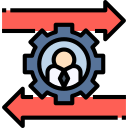
Your Second Act Starts Here
Selected theme: Mid-Life Career Reskilling: Opportunities and Challenges. Step into a practical, hopeful space where experience becomes an advantage, learning fits real life, and transitions feel possible. Join the conversation, subscribe for weekly guidance, and share your story to inspire others on the same path.
Technologies evolve, industries blur, and careers now span multiple chapters. Your maturity, judgment, and pattern recognition are assets. Reskilling is not starting over; it is starting smarter with lived context.
Understanding the Mid-Life Reskilling Landscape
Roles at the intersection of people and tech keep expanding: data-informed operations, product enablement, customer success, compliance, and digital transformation. These areas value communication, reliability, and systems thinking cultivated over decades.
Understanding the Mid-Life Reskilling Landscape
Identifying and Translating Your Transferable Strengths
List accomplishments, not duties: problems solved, risk reduced, revenue protected, teams steered. Pull emails, reports, and metrics as receipts. Evidence beats adjectives when telling employers why you fit.


Identifying and Translating Your Transferable Strengths
A project schedule becomes product delivery; a safety audit becomes risk management; onboarding new hires becomes enablement. Matching terminology helps recruiters and hiring managers connect your past to their present.
Learning Paths That Fit Real Life
Microlearning, certificates, and stackable wins
Short, focused courses create visible progress and confidence. Stack them into certificates aligned with job descriptions. Celebrate each milestone publicly to attract feedback, mentors, and accountability partners.
Project-first learning for credibility
Anchor every topic to a small, real project. Build a dashboard from public data, redesign a process, or draft a product spec. Tangible artifacts speak louder than transcripts or course lists.
Mentors, peers, and practice communities
Join cohorts, alumni circles, or local meetups. Ask for code reviews, demo days, or mock interviews. Community shortens the learning curve and keeps energy high when motivation dips.
Design a weekly learning cadence
Block two focused evenings and one weekend sprint. Keep sessions predictable and short. Use timers, single-task focus, and a visual progress tracker. Progress compounds when it becomes rhythm, not heroics.
Sustainable motivation beats bursts
Pair learning with a routine you already keep—morning coffee, lunch breaks, or evening walks. Attach small rewards, and review progress every Sunday. Tiny celebrations fuel the long game.
Negotiate support with your stakeholders
Have a family meeting. Share your why, timeline, and what you need: quiet hours, chore swaps, encouragement. People rally around clear plans and honest constraints when they feel included.
Mindset, Identity, and Navigating Bias
Reframing the beginner label
You are not a beginner at solving problems, learning fast, or managing complexity. You are new to a toolset. That distinction preserves dignity and highlights real strengths.

Networking and Storytelling That Open Doors
Frame your pivot like a product story: problem you saw, insight you gained, experiments you ran, impact you achieved. End with the specific role you are now targeting.
Networking and Storytelling That Open Doors
Share weekly notes, code snippets, or process maps. Host a short demo on LinkedIn Live or a community forum. Visibility invites serendipity—support, referrals, and opportunities you cannot script.

Weeks 1–3: Orientation and quick wins
Define target roles, gather five job descriptions, and map required skills. Complete two micro-courses and ship one small project. Post progress publicly and ask for one mentor introduction.
Weeks 4–8: Projects and feedback loops
Build a portfolio piece tied to a real business problem. Schedule two reviews with practitioners. Iterate fast, document decisions, and capture measurable outcomes that speak the language of hiring managers.
Weeks 9–12: Market test and iteration
Run informational interviews, apply intentionally, and practice interviews weekly. Track responses, refine your story, and adjust projects. Share lessons learned and invite readers to swap feedback and leads.
